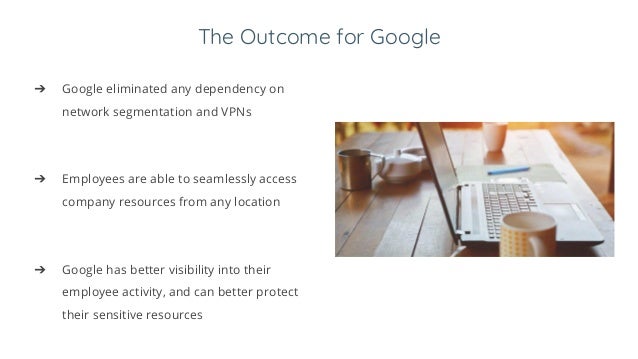
#BEYONDCORP PAPERS FROM GOOGLE CODE#
Trusted machines running code with known provenanceĬhoke points for consistent policy enforcement across services, for example, ensuring authorized data access No inherent mutual trust between services In BeyondProd, we developed and optimized for the following security principles: At the same time, we also applied these principles to how we connect machines, workloads, and services. BeyondCorp applied zero-trust principles to define corporate network access. In 2014, Google introduced BeyondCorp, a network security model for users accessing the corporate network. In the same way that users aren't all in the same physical location or using the same device, developers don’t all deploy code to the same environment. In a cloud-native environment, the network perimeter still needs to be protected, but this security model is not enough-if a firewall can't fully protect a corporate network, it can't fully protect a production network either. Modern security approaches have moved beyond a traditional perimeter-based security model, where a wall protects the perimeter and any users or services on the inside are fully trusted.

BeyondProd: A new approach to cloud-native security As many organizations seek to adopt cloud-native architectures, we hope security teams can learn how Google has been securing its own architecture, and simplify their adoption of a similar security model. Today, we’re introducing a whitepaper about BeyondProd, which explains the model for how we implement cloud-native security at Google. Google’s cloud-native architecture was developed prioritizing security as part of every evolution in our architecture. Google’s architecture is the inspiration and template for what’s widely known as “ cloud-native” today-using microservices and containers to enable workloads to be split into smaller, more manageable units for maintenance and discovery. Then in 2018, the FCC issued an order that redefined broadband internet services, treating them as "information services" under Title I of the Communications Act instead of more regulated "telecommunications services" under Title II of the Communications Act.At Google, our infrastructure runs on containers, using a container orchestration system Borg, the precursor to Kubernetes. In 2017, under the leadership of then-chairman Ajit Pai, the US Federal Communications Commission tossed out America's net neutrality rules, to the delight of the internet service providers that had to comply. SB 822, for example, forbids "zero-rating" programs that exempt favored services from customer data allotments, paid prioritization, and blocking or degrading service. The decision is a blow to the large internet service providers that challenged California's regulations, which prohibit network practices that discriminate against lawful applications and online activities. The US Ninth Circuit Court of Appeals on Friday upheld a lower court's refusal to block California's net neutrality law (SB 822), affirming that state laws can regulate internet connectivity where federal law has gone silent.
#BEYONDCORP PAPERS FROM GOOGLE PC#
In that vein, this column has previously covered the PC releases of Death Stranding (not for everyone) and Days Gone (not perfect), and we've learnt that the measure of a port is "how badly have they fucked this up?" Continue reading The RPG has entered its third year as God of War becomes the latest in a number of erstwhile "exclusives" that have made the leap to the desktop. We played it and loved it, though without a dedicated spot on the site for gaming it would have felt strange to suddenly write about the experience.


Back in 2018, The Register was lucky enough to receive a copy ahead of its original release.

How do you make a flawless PlayStation exclusive even better? The answer seems to be to port it to PC, which is what happened with God of War on 14 January. Long may this trajectory of PlayStation titles eventually coming to PC continue – because we now have God of War. The RPG Greetings, traveller, and welcome back to The Register Plays Games, our monthly gaming column.


 0 kommentar(er)
0 kommentar(er)
